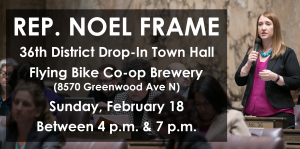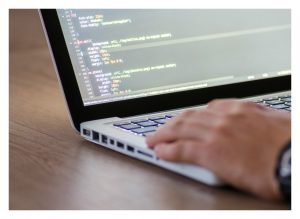
This coming Sunday, February 18, Rep. Gael Tarleton and I will be at the Flying Bike Co-op Brewery in Greenwood (8570 Greenwood Ave N) between 4 p.m. and 7 p.m.
Please feel free to stop by, have a drink, and sit down to talk with me about the current legislative session and the issues that matter to you. As a “Drop-In” Town Hall we encourage you to join us anytime in the three-hour window that works for you. We’ll aim for casual small group conversation and try to swap out who is at the table to ensure everyone gets a chance to be heard! Kids are welcome! We’ll provide some food; beverages are no-host. I hope you’ll join me!
Teen sexting bill in the News
In last week’s video update, I told you about my bill to adjust state laws so teens who choose to send consensual, sexually explicit images – commonly known as “sexting” – will no longer face being charged with a felony sex offense. While House Bill 2932 is no longer alive, the Senate companion bill sponsored by Senator Dhingra was passed by the Senate on Saturday morning on a bipartisan vote of 31-16. I look forward to helping to shepherd this bill across the proverbial finish line as it makes its way through the State House!
Learn more about the importance of this legislation in this recent Seattle Times editorial.
Safeguarding Net Neutrality
 This week I was excited to vote on a bill to protect net neutrality and ensure that Washingtonians have access to a free and open internet. House Bill 2282, which I co-sponsored, passed out of the House with broad bipartisan support on a 93-5 vote. The bill will ensure that under the state’s consumer protection authority, Washington will continue to safeguard net neutrality for consumers despite the Federal Communications Commission’s rollback of these protections. Specifically, the bill protects consumers from internet service providers:
This week I was excited to vote on a bill to protect net neutrality and ensure that Washingtonians have access to a free and open internet. House Bill 2282, which I co-sponsored, passed out of the House with broad bipartisan support on a 93-5 vote. The bill will ensure that under the state’s consumer protection authority, Washington will continue to safeguard net neutrality for consumers despite the Federal Communications Commission’s rollback of these protections. Specifically, the bill protects consumers from internet service providers:
- Blocking lawful content;
- “Throttling,” or slowing down, lawful content; and
- Favoring certain content over others due to special deals (“paid prioritization”).
I look forward to seeing this critical legislation move through the Senate.
Ending Discriminatory Housing Practices
Washington is experiencing a housing crisis that hurts many of our families and friends. In this state, landlords can reject prospective tenants because they receive housing subsidies. For vulnerable renters, this just makes matters worse. Even those who have good credit, no criminal history, and full-time employment struggle to find a place to live.
 No one should be denied a home because they are receiving rental or income assistance. House Bill 2578, which I cosponsored, bans discriminating against potential renters because they need a little help to pay for housing. The bill passed the House this week on a vote of 61-37.
No one should be denied a home because they are receiving rental or income assistance. House Bill 2578, which I cosponsored, bans discriminating against potential renters because they need a little help to pay for housing. The bill passed the House this week on a vote of 61-37.
Learn more about the importance of giving renters a fair shot at finding a home in this video of my colleague, Rep. Marcus Riccelli of Spokane, the sponsor of the bill.
Why does the Legislature…?
Now that we have passed the halfway point in this 60-day session, we’ll be spending a lot more time on the House floor debating and voting on bills. This is an exciting time to see the ideas, hard work, and dedication of lawmakers, staff, advocates, agencies, and citizens come to fruition.
Before a bill can come to the floor, however, it goes through what’s called the Rules Committee. For example, my bill on expanding juvenile jurisdiction (HB 2895) is current awaiting a Rules “pull.” This week, we’ll break down that process.
Q: What is the Rules Committee?
After a bill passes out of a policy or fiscal committee, the next stop for every bill is the Rules Committee. The Rules Committee determines which bills will be placed on the floor calendar to be voted on by the entire House of Representatives. Each member on the committee gets to select two or three bills that they would like to “pull” to second reading and place on the floor calendar. It is customary to not choose your own bill, but instead pull bills that other members have requested, or by selecting a piece of legislation about which that committee member feels strongly.
To see which bills make it to second reading and are on the calendar, check out the House Floor Activity Report.
During second reading, the chamber discusses the merits of legislation. This is where amendments can be offered to bills. Then, in third reading, a roll call vote on final passage takes place (no amendments allowed). A simple majority passes most bills. Once a House bill passes, it goes over to the Senate to begin the process again.
As always, please feel free to reach out and share your comments, questions, and ideas!
Sincerely,

Rep. Noel Frame
